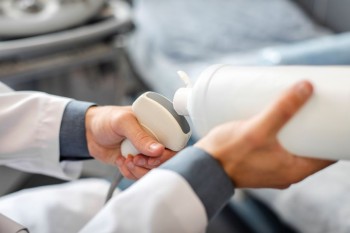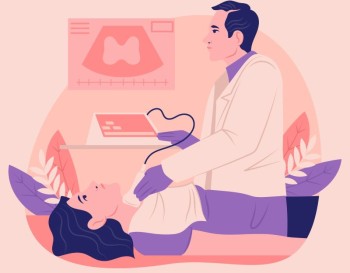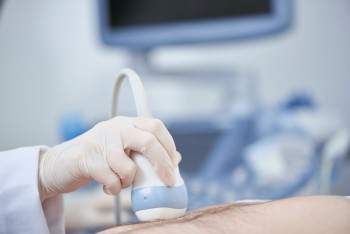
The Scrotum Doppler Test is a diagnostic procedure designed to assess blood flow within the scrotum and testicles.
Scrotum Doppler in India with Cost
Scrotum Doppler Test: A Comprehensive Examination
The Scrotum Doppler Test is a diagnostic procedure designed to assess blood flow within the scrotum and testicles. Utilizing Doppler ultrasound technology, this non-invasive test provides valuable insights into the vascular health of the testicular region. Below is an in-depth exploration of the Scrotum Doppler Test.
Purpose of the Scrotum
Doppler Test
The primary purpose of the Scrotum Doppler Test is to evaluate blood circulation within the testicles and scrotum. This test is particularly significant in diagnosing conditions such as varicoceles, testicular torsion, or other vascular abnormalities that may impact reproductive health.
Procedure
During the Scrotum Doppler Test, a handheld device called a transducer emits high-frequency sound waves toward the scrotum. The echoes produced by these sound waves create real-time images of blood flow within the testicular arteries and veins. This imaging helps healthcare professionals assess the presence of any abnormalities or blockages.
Preparing for the Test
Preparation for the Scrotum Doppler Test is generally minimal. Patients may be instructed to wear loose-fitting clothing to facilitate easy access to the scrotum. Communicating any pre-existing conditions or medications to the healthcare provider is important for accurate interpretation of results.
Signs and Symptoms Leading to the Scrotum Doppler Test
The Scrotum Doppler Test is recommended when individuals experience symptoms such as scrotal pain, swelling, or fertility concerns. It aids in identifying the underlying vascular causes of these symptoms and plays a crucial role in guiding appropriate treatment.
Understanding the Test
Results
Test results from the Scrotum Doppler provide detailed information about blood flow in the testicular arteries and veins. This information assists healthcare professionals in diagnosing conditions like varicoceles (enlarged veins in the scrotum) or detecting testicular torsion (twisting of the testicle's blood vessels).
Conditions Detected by the Scrotum Doppler Test
The Scrotum Doppler Test is instrumental in detecting various conditions affecting the testicular vasculature. This includes varicoceles, which can impact fertility, and testicular torsion, a medical emergency requiring immediate intervention.
Importance in Reproductive Health
In the realm of reproductive health, the Scrotum Doppler Test plays a pivotal role. It aids in the diagnosis of conditions that may affect male fertility and assists healthcare providers in formulating appropriate treatment strategies.
Limitations and Considerations
While the Scrotum Doppler Test is highly informative, it may not detect all causes of scrotal pain or fertility issues. Additional tests or assessments may be recommended for a more comprehensive evaluation.
What to Expect During the Test
The Scrotum Doppler Test is a painless and non-invasive procedure. Patients lie comfortably, and the healthcare provider applies a gel to the scrotum before using the transducer to capture images. The entire process is conducted in a controlled and private setting.
Interpreting Test Results
Urologists and healthcare professionals interpret the Scrotum Doppler Test results to identify specific vascular issues. Based on these findings, they can recommend treatments ranging from conservative approaches to surgical interventions, depending on the diagnosed condition.
Conclusion
In conclusion, the Scrotum Doppler Test is an essential diagnostic tool for assessing the vascular health of the testicles and scrotum. Its non-invasive nature and ability to provide real-time imaging make it a valuable component in the comprehensive evaluation of male reproductive health.
Frequently Asked Questions (FAQs) - Scrotum Doppler
Test
1. How long does a Scrotum Doppler Test take?
The Scrotum Doppler Test typically takes around 15 to 30 minutes, depending on the complexity of the examination and individual factors.
2. Is the Scrotum Doppler Test painful?
No, the Scrotum Doppler Test is a non-invasive and generally painless procedure. Patients may feel slight pressure from the ultrasound transducer, but discomfort is minimal.
3. Is there any preparation needed before a Scrotum Doppler Test?
Minimal preparation is required. Patients may be advised to wear loose-fitting clothing to facilitate easy access to the scrotum. It's important to inform the healthcare provider about any medications or pre-existing conditions.
4. How often should someone undergo a Scrotum Doppler Test?
The frequency of Scrotum Doppler Tests depends on specific symptoms or concerns. Healthcare providers will recommend the appropriate schedule based on individual needs.
5. Can the Scrotum Doppler Test detect all causes of scrotal pain?
While the Scrotum Doppler Test is highly informative, it may not capture all potential causes of scrotal pain. Additional tests or assessments may be recommended for a more comprehensive evaluation.
6. What symptoms warrant a Scrotum Doppler Test?
Symptoms such as scrotal pain, swelling, or fertility concerns may warrant a Scrotum Doppler Test. Healthcare providers assess individual cases for appropriate testing based on symptoms and medical history.
7. Is the Scrotum Doppler Test only for fertility issues?
No, the Scrotum Doppler Test is not limited to fertility issues. It is also used to diagnose conditions such as varicoceles and testicular torsion, which can impact reproductive health.
8. Are there any risks associated with the Scrotum Doppler Test?
The Scrotum Doppler Test is considered safe with minimal risks. Patients may experience mild discomfort, but serious complications are rare. Healthcare providers take necessary precautions for patient safety.
9. Can the test be performed on individuals with a history of testicular surgery?
In many cases, the Scrotum Doppler Test can be performed on individuals with a history of testicular surgery. However, it's important to inform the healthcare provider about any previous surgeries for proper evaluation.
(0)
Login to continue



